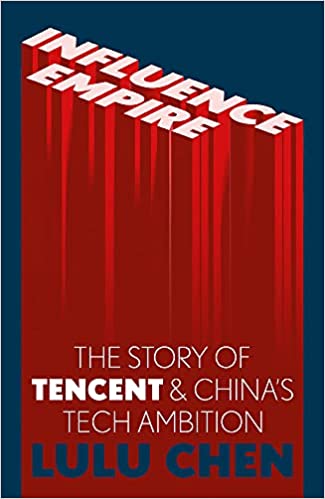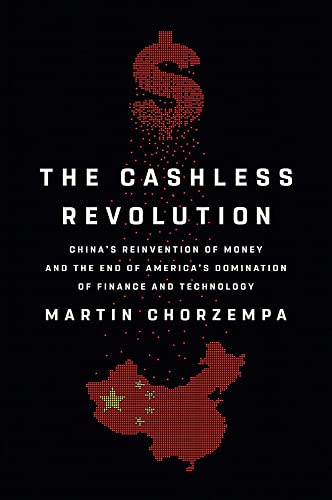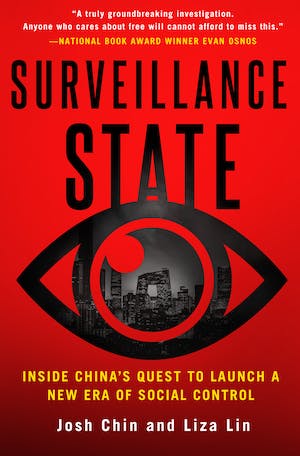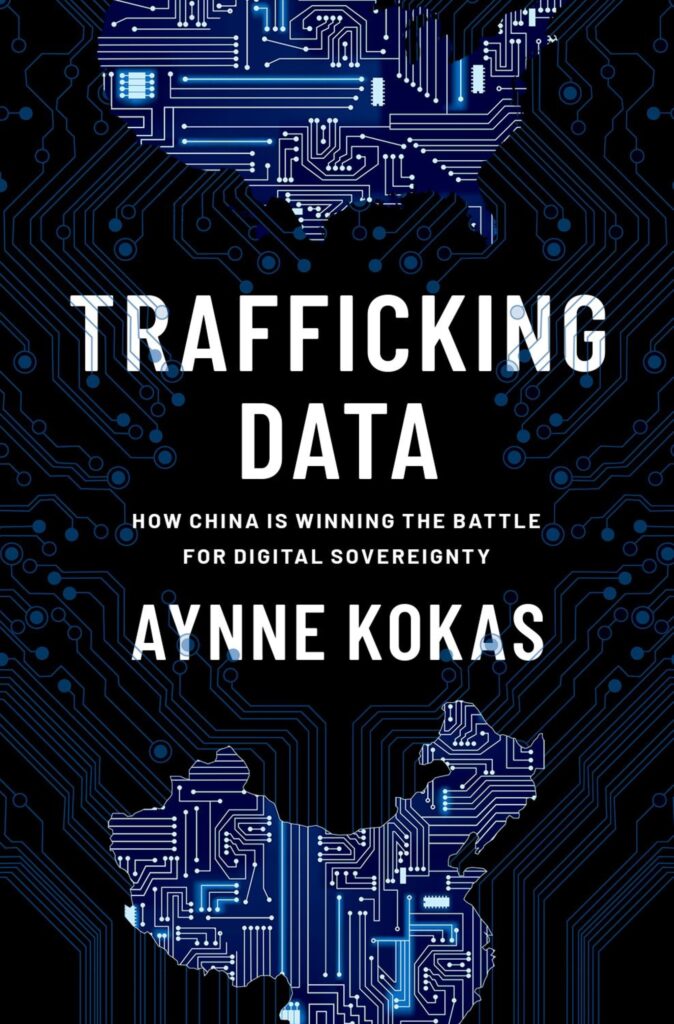Reviews of The Cashless Revolution by Martin Chorzempa. PublicAffairs, 2022; Influence Empire by Lulu Chen. Hodder & Stoughton, 2022; Surveillance State by Josh Chin and Liza Lin. St. Martin’s Press, 2022; Trafficking Data by Aynne Kokas. Oxford, 2022.
So completely have Tencent’s WeChat and digital payments taken over life in modern China that it is difficult to remember what it was like to live without them. But they are just the surface manifestations of more sweeping technological change affecting how China’s people live, how its economy operates, and how the country is governed. As multiple new books underscore, the implications of these changes matter not just to China, but to the world.
Unlike the flamboyant founder — until his recent troubles — of Alibaba, Jack Ma, Tencent’s founder, the unrelated Pony Ma, has always maintained a lower profile. In Influence Empire, Bloomberg reporter Lulu Yilun Chen chronicles Pony and his company’s rise to the heights of China’s technology industry. Today, Tencent is not just the keeper of WeChat, with its more than one billion users, or WeChat Pay, which facilitates staggering volumes in annual transactions, but also a vast gaming, media, cloud, and artificial intelligence enterprise with a host of investments ranging from Chinese food delivery service Meituan to Tesla.
Pony, like most entrepreneurs who define an age, is a product of talent and timing. A prodigious student, Pony came of age in the booming special economic zone of Shenzhen, graduating with a degree in computer science shortly before China joined the world wide web. Pony, as Chen reveals, also possesses something rarer which may explain his enduring success: sound judgment. In Tencent’s early days as developer of the QQ instant messaging service, for example, he was sensitive to avoid the government “red lines” that other competitors were willing to flout for short-lived growth. Thanks to his low-key temperament, he has refused to court the spotlight that in China almost invariably invites a comeuppance by the Communist Party.

* * *
The quest by some in the West to create an equivalent “everything” app to WeChat represents a fundamental misunderstanding of the source of its dominance. Technical brilliance surely isn’t the reason: feature for feature, the single-purpose solutions on offer in the West surpass any of WeChat’s functions. Instead, it is a consequence of protectionism, monopoly, and market failure at work. (This is not to deny the tenacity it took for Tencent to initially outcompete its way to dominance, but, if not Tencent, another super-app would likely have emerged in China given the conditions.)
WeChat thrives in China and China alone (setting aside diaspora communities) because the country restricts foreign competition. Tencent and Alibaba have further preempted competition by investing in walled-in ecosystems that Beijing has only just begun to seriously address. At the same time, not unlike classic emerging market conglomerates, the superapp emerged to fill an institutional void. WeChat Pay mitigated the underpenetration of credit cards as the backbone of a consumer payments system while the persistent digital identity it offered users addressed a paucity of social trust in Chinese life online and off.
In expanding beyond payments to financial services, the tech giants went too far, threatening to upend China’s controlled financial system. Consumers eagerly responded to the opportunity to earn more than the repressed interest rates on offer at China’s banks while entrepreneurs were keen to be extended credit on the basis of their financial potential, not their political connections. Days prior to going public on the New York Stock Exchange, Ant Financial, spun-out from Alibaba in controversial circumstances, was ordered by Beijing to pull its listing. Founder Jack Ma would spend months in political purgatory. (The central government would also scrutinize Alibaba’s media portfolio and restrict Tencent’s game empire as part of a broader crackdown.)
Going forward, Beijing has made clear that it will be the government that sets the pace on fintech. Its goal, as ever, Martin Chorzempa writes in The Cashless Revolution, is to protect the “state’s sovereign prerogatives and centralized power to monopolize money provision, supervise the financial system, and surveil its population.” It is also determined to shield itself from a dollar-based financial system increasingly weaponized to advance American interests.

And yet, by forsaking fintech’s reform potential for its authoritarian kind, Beijing’s aspirations for “common prosperity” and global leadership will move further out of reach. Instead of reducing barriers to commerce, a traceable, digital renminbi will make the “access” corruption that has facilitated much of China’s growth all the more difficult. Instead of allowing for more targeted monetary policy, political imperatives may lead to distortive, parallel economies. By chilling its e-commerce sector and arresting outbound tourism, the government has negatively disrupted two of the highest potential means of growing the renminbi’s global adoption.
* * *
The proliferation of the means of data collection and the acceleration of its processing enabled the horror of the Xinjiang surveillance state. Little about Uyghurs’ lives escapes the discovery of the government and its obsession to classify them on a spectrum of perceived threat. Due to China’s Covid-zero policies, the rest of China has come to experience a form of this technological oppression. Covid health codes, which track one’s comings and goings and proximity to others for contact tracing, have created a sense of uncertainty every time one steps out their door. The codes have even been weaponized by local government officials, later punished, who sought to obstruct the movement of would-be protesters.

As Josh Chin and Liza Lin, reporters with the Wall Street Journal, write in Surveillance State, little is unique about the technologies China is deploying. Democratic and autocratic governments alike are making use of facial recognition, other biometric data, and the digital exhaust of their citizens to fight crime. Corporations use much of the same data to induce ever more consumption. The judicial system may not be enough, the authors warn, to protect Americans from the potential abuses of these still error-prone technologies. That is because, perversely, “unlike their Chinese counterparts, who are happy to trumpet their new surveillance tools, American police tend to shroud their arsenals in secrecy. The more powerful the tool is, the more care they often take to shield it from view.”
Both Xinjiang and Covid raise doubts about the notion of an efficient, data-driven dictatorship. If China’s surveillance state were truly effective in targeting threats to political stability, it wouldn’t have needed to send hundreds of thousands of Uyghurs off for re-education nor would it be reliant on the ritual of mass-testing in its cities. Chin and Lin present a similarly nuanced view of China’s social credit system. In a society without traditional financial credit scores, and low levels of social trust, such a system is not without merit. While Beijing may wish to revive the old dangan system of social control, in practice, social credit is far from all-encompassing and unlikely to be so. The clumsy patchwork of systems, they suggest, is more akin to “Potemkin AI.”
Just because China’s surveillance state fails to work as described doesn’t mean it doesn’t work as intended: it is capable of striking fear into those subject to its reach, even those far beyond its borders. As some overseas Chinese sought to express solidarity with the Beijing “Bridge Man” who protested the 20th Party Congress, the Straits Times reported on a London postgraduate who “turned off her phone to avoid being tracked and [whose] friends suggested wearing gloves so they would not leave fingerprints.”
* * *
It is ironic that China has stricter data privacy laws than the United States, at least insofar as what corporations can collect about users and the circumstances in which data about Chinese consumers can leave the country. The Chinese government, of course, is unbound in what it can know about its citizens. (Private WeChat conversations, not just public posts, for example, are monitored and subject to censorship and punishment.)
Aynne Kokas, a scholar at the University of Virginia, argues that laxity in American data privacy regulation grants China an economic and national security advantage. “China influences the worldwide circulation and security of commercial data,” she writes, and encourages its firms to “extract data from the US system as that data becomes an ever more valuable commodity.”

Apart from TikTok and the acquisition of gay dating app, Grindr, by a Chinese firm, compelling examples of what Kokas terms “data trafficking” are wanting. (The Grindr acquisition was subsequently ordered unwound.) Kokas does not demonstrate that the array of often cheap, digitally connected consumer goods which store user data in China have caused actual harm nor does she articulate a compelling prospective case for it.
While Apple may grant Beijing access to Chinese users’ data in compliance with its national security laws, Beijing is not compelling Apple to weaken privacy protections for users outside its borders or facilitate access to their data. Alibaba is not meaningfully competing internationally with Amazon, Google, or Microsoft to hover up data to its cloud. Even with Huawei, the risk wasn’t that its technology would inherently cause data to flow through Beijing, but that intentional vulnerabilities in its systems would enable Beijing to steal data and disrupt critical systems.
The outright theft of Americans’ data by Beijing would persist even if the United States tightened its data privacy regulations. In separate incidents over the past decade, Beijing has stolen everything from security clearance and health insurance information to credit score and hotel data. Theft, the expropriation of scientific research with military implications from Western universities and Beijing’s efforts to shape technological standards to its advantage remain the greater concerns. If anything, it is China’s data that is uniquely vulnerable despite its nominal protections. China’s pervasive surveillance of its own people disincentivizes encryption, making it no less easy for foreign governments to snoop on Chinese politicians and businesspersons.
* * *
The algorithms which drive much of our digital lives are intended to do one thing: to maximize user attention for as long as possible. On platform after platform, that has often led to privileging polarization and extremism. Even at their most benign, the path-dependency they create leads to an essentializing of oneself instead of the broadening the early Internet once promised. Currently, no algorithm is more feted and feared than that which powers TikTok, the short video app owned by ByteDance.
In the United States, calls to ban TikTok outright are growing amid reports that the White House is pursuing a more-limited data management agreement. Critics argue that, at best, Beijing has access to data about millions of Americans; and at worst, could weaponize the platform for information warfare. Despite these concerns, a ban would be unwise due to questions about its effectiveness, legality and implications, and superiority to other alternatives.
Banning TikTok would not end the epidemic of misinformation which plagues other platforms. Although Facebook has inhibited full understanding of the role Russian activities on its platform may have played in influencing voters, the one hundred or so thousand dollars Russia spent on social media advertising in 2016 pales in comparison to what the campaigns themselves and other American-based groups, with often no less deleterious rhetoric, were spending. Social media may exacerbate democratic breakdown, but it is not the cause.
It is also unclear if there is a legal basis for a president to ban TikTok. If the courts were to ultimately endorse such a decision, it would be a regrettable further expansion of the imperial presidency. While the possibility of divestment to US-based owners has merit, it runs the risk of inviting Beijing to expropriate American investments in that country.
As appealing as reciprocity may seem, given China’s bans of American social media, it is not always the best answer. A ban would endorse Beijing, and other authoritarian powers’, calls for “internet sovereignty.” Instead, a higher form of reciprocity would be to make TikTok central to a services trade challenge, granting the United States permission to impose reciprocal trade sanctions equivalent to the value denied American technology firms.
There are other alternatives that are both more holistic in scope and have a greater possibility of success. At home, the United States should reform safe harbor provisions that shield internet companies from liability so that they have an affirmative obligation to prevent harm via their services. This would affect all social media, regardless of national origin, including WeChat, which is often host to disinformation targeting Chinese language communities in the United States. The United States also needs a credible deterrent if TikTok were to be used as an instrument of information warfare. A more consequential sanction than seeking to tear down China’s Great Firewall would be to complete it, blocking non-essential access from Chinese internet users to the American web services that Beijing has not already denied them.
* * *
No technological risks currently weigh more heavily on the minds of policymakers than the possibility that China will achieve dominance in artificial intelligence and the reality that nearly all of the production of advanced semiconductors takes place in Taiwan.
In recent weeks, the Biden administration has imposed sweeping sanctions intended to deny China’s access to advanced chip production technologies while Congress has invested billions to support domestic production. The administration’s sanctions are a preemptive strike less likely to retard China’s military threat than it is to heighten the probability of a conflict that the United States is failing to deter.
While the conflict in Ukraine has produced many lessons, not all of them transferable, one is clear: the disproportionate impact the most technologically sophisticated weapons can have and the fact that American inventories and manufacturing capacity of them are limited. Untested though China’s military may be, even if it is denied the most sophisticated systems, its capacity to produce more, faster may prove to be decisive.